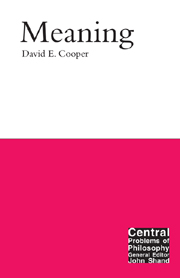5 - Meaning, society and the human sciences
Summary
In Chapters 3 and 4, the focus has been upon linguistic meaning, salutary though it was at strategic points to recall that meaning is not the monopoly of language. In the remainder of this book, it is no longer the focus. The topic for Chapter 6 is meaning in the arts, plastic and musical no less than literary; while, in Chapter 7, it is the meaning of human life itself that is the subject. In the present chapter, our broad and amorphous domain coincides with the subject matter of the social or human sciences, the Geisteswissenschaften – with, inter alia, symbolic behaviour, ritual, social role, etiquette and taboo. It is the domain, in effect, that some students of the Geisteswissenschaften identify precisely as the context of meaningful human behaviour.
It would be wrong, of course, to disjoin this domain from language. Older works, like Darwin's (1873) on the expression of emotions that explain types of human action, such as gestures, as “residues” of merely animal behaviour now look quaint, not least because they ignore the whole new context for behaviour that human language provides. (Are they less quaint, though, than recent “explanations” of human behaviour offered by sociobiologists who, readers may feel, haven't noticed that this is, indelibly, the behaviour of creatures who speak?) It is not simply that words often accompany meaningful actions, or that they are available for describing them; rather, words are typically among the media through which the actions are performed.
- Type
- Chapter
- Information
- Meaning , pp. 85 - 106Publisher: Acumen PublishingPrint publication year: 2003



